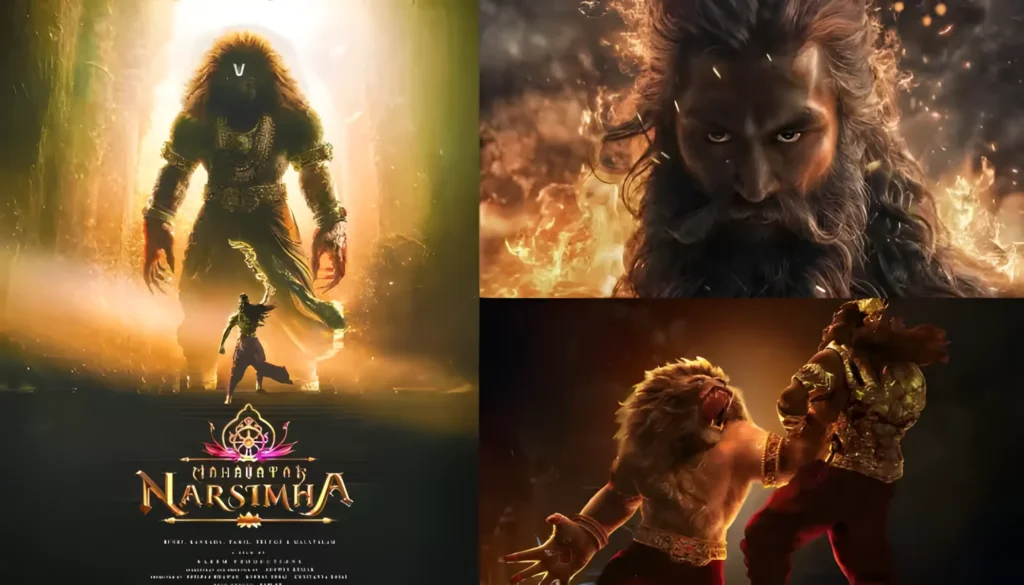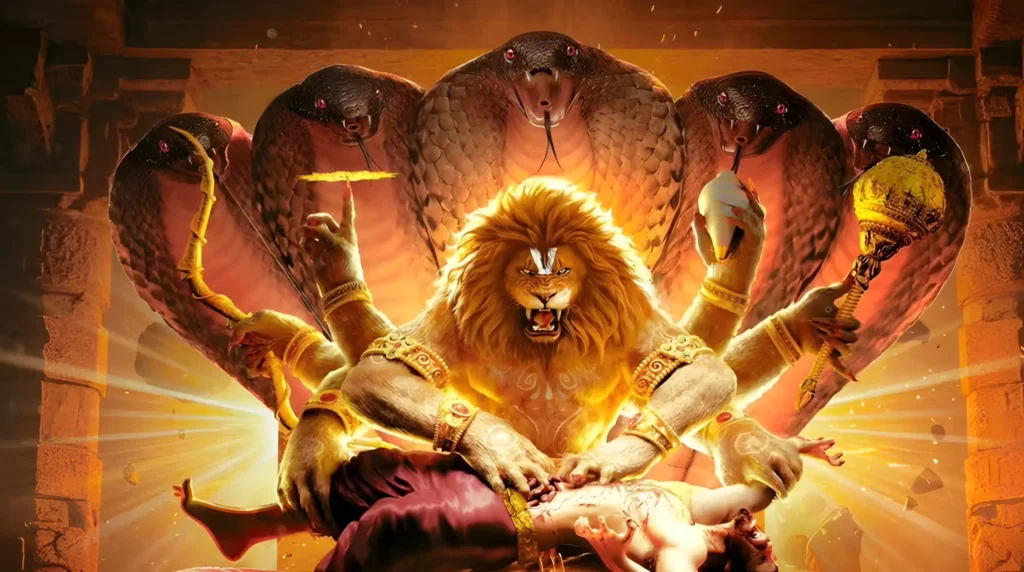Indian cinema has always been deeply intertwined with mythology, but few films have attempted such an audacious blend of ancient scripture and cutting-edge visuals as Mahavatar Narsimha (2025). Directed by Om Raut and promoted as a “mythoverse” experience, this bold reimagining of Lord Vishnu’s fierce avatar—Narasimha, the half-man, half-lion form—has sparked both acclaim and debate.
The film is a visual feast, rich with Vedic symbolism, dramatic storytelling, and high-end VFX. Yet, its intense style and thematic weight may not appeal to everyone.
Also Read: “Saiyaara” (2025): Who Should Watch This Movie, Who Should Skip, and an Honest Critique
So, is Mahavatar Narsimha the kind of film you should watch? Let’s break it down:
- What the film offers
- Who it will deeply resonate with
- Who might not find it engaging
- And whether it deserves your time on the big screen or later on OTT

Plot Overview (No Major Spoilers)
Mahavatar Narsimha is a modern retelling of the iconic tale from the Bhagavata Purana—the clash between the demon king Hiranyakashipu and his pious son Prahlad. Gifted with divine immunity, Hiranyakashipu demands worship as a god. His son, a staunch devotee of Vishnu, refuses. What follows is a cosmic showdown that ends with the emergence of Lord Narasimha, the fierce protector who defeats ego with divine justice.
While staying largely true to its mythological roots, the film includes imaginative additions—flashbacks to earlier Yugas, symbolic dream sequences, and expanded character arcs—to broaden its narrative.
Who Should Definitely Watch Mahavatar Narsimha?
1. Devotees & Followers of Hindu Mythology
If you’re spiritually inclined or have grown up with stories of Narasimha, this film will likely strike a powerful emotional chord. From Vedic chants to divine iconography, the film is drenched in reverence and grandeur.
2. Fans of Epic Fantasy & Myth-Based Cinema
If you enjoyed Baahubali, Kantara, or even The Passion of the Christ, you’ll appreciate Mahavatar Narsimha‘s epic scale and stylized approach to moral storytelling. It blends slow-motion action, CGI-driven worlds, and mythic battles of good vs. evil.
3. Students of Indian Culture or Religion
For those studying Indian literature, epics, or dharmic philosophy, the film offers a unique visual translation of cosmic allegories. Though dramatized, it serves as an accessible entry into complex mythological themes.
4. Admirers of High-Concept Cinema
The film doesn’t play it safe—it experiments with nonlinear timelines, surreal imagery, and layered metaphors. Visual storytelling enthusiasts will admire its daring cinematic language.
5. Seekers of Spiritual or Philosophical Meaning
At its heart, Mahavatar Narsimha is more than a battle tale—it explores ego vs. faith, power vs. surrender, and illusion vs. truth. These timeless themes may offer deep reflection for spiritually minded viewers.
Certainly! Here’s a refined, SEO-optimized, and reader-friendly continuation of your blog post using the keyword “Mahavatar Narsimha” naturally throughout:
Who Might Want to Skip Mahavatar Narsimha?
While Mahavatar Narsimha (2025) is a grand cinematic experiment blending mythology and modern visual storytelling, it’s not tailored for every viewer. Certain audience groups may find it less engaging depending on their tastes and expectations.
1. Fans of Realistic or Logic-Driven Cinema
If you’re a viewer who prefers grounded storytelling, Mahavatar Narsimha might feel overly fantastical. The film embraces mythic logic rather than realism—characters speak in Sanskritised Hindi, the settings are ethereal, and events unfold according to cosmic timelines rather than rational cause-effect dynamics.
Don’t expect courtroom drama, urban realism, or slice-of-life emotions here—it’s a mythic spectacle, not a conventional narrative.
2. Those Expecting a Fast-Paced, Contemporary Plot
Despite some intense action scenes, Mahavatar Narsimha is more philosophical than pulse-pounding. Long monologues, spiritual chants, and meditative sequences dominate the runtime. With a length of 2 hours and 40 minutes, it demands patience—especially if you’re not already invested in Vedic or devotional themes.
If your idea of engaging cinema leans toward fast-paced thrillers or crisp editing, this film may feel slow and contemplative.
3. Younger Audiences Expecting Marvel-Style Superhero ActionAdvertisement
The promotional material for Mahavatar Narsimha—filled with CGI and epic battles—may lead younger viewers to expect a mythological superhero experience. But unlike Marvel or DC, this film prioritizes symbolism over spectacle.
Yes, there are dramatic visual effects, but the film places more weight on dialogue, metaphors, and cosmic allegory than quick action set-pieces. Action is present, but it’s secondary to spiritual narrative.
4. Viewers Sensitive to Religious Representation
As with any mythology-based film, Mahavatar Narsimha walks a fine line between faith and fiction. Some may feel it takes too many creative liberties, while others may feel it sticks too rigidly to scripture and misses a chance to modernize the message.
There are occasional parallels drawn to contemporary issues, but they’re subtle enough to leave room for interpretation—potentially divisive depending on personal or ideological views.

⭐ The Good: What Works Brilliantly in Mahavatar Narsimha
Despite its polarizing aspects, Mahavatar Narsimha has several strengths that make it worth the experience for many viewers:
1. Visual Grandeur & Unique Art Direction
The visual design is breathtaking. From the celestial landscapes of Vishnu Lok to the mystical transformation of Narasimha, the film marries Raja Ravi Varma aesthetics with modern CGI. Every frame feels like a moving painting—metaphoric, stylized, and spiritually rich.
2. Strong Performances
The antagonist, Hiranyakashipu, is portrayed with layered menace and depth—not just a tyrant but a tragic figure driven by ego. Prahlad’s innocence feels authentic, and Lord Narasimha’s silent, powerful presence steals the screen. Post-production amplifies the divine ferocity of the avatar without turning him into a mere CGI creature.
3. Resonant Background Score
The soundtrack deserves applause. Traditional Vedic chants, classical instrumentation, and orchestral arrangements make the film’s emotional moments feel deeply spiritual. The background score during Narasimha’s arrival is truly goosebump-worthy.
4. Philosophical Themes with Cultural Relevance
Unlike preachy religious films, Mahavatar Narsimha asks existential and spiritual questions subtly—What defines true power? What is the ego? What is surrender?
The film balances reverence with artistry, never turning into a sermon, yet leaving thoughtful viewers with plenty to ponder.

❌ The Flaws: What Doesn’t Quite Work
No film is without its missteps, and Mahavatar Narsimha faces a few challenges:
1. Uneven Screenplay and Pacing Issues
While the film starts with promise, the second act becomes sluggish, with long dialogues and metaphoric visuals diluting the narrative’s momentum. The pacing may test casual viewers unfamiliar with Upanishadic-style storytelling.
2. Excessive Stylization Over Emotion
At times, the symbolism feels overbearing. Instead of drawing audiences into emotional moments, some scenes come off as visual showcases—detaching the viewer from character depth.
3. Limited Accessibility for Non-Hindi Speakers
The film’s archaic language and philosophical terminology may alienate international or regional viewers, even with subtitles. Some nuances get lost in translation, reducing its emotional impact for a broader audience.
4. Underdeveloped Supporting Characters
While Hiranyakashipu and Prahlad are well-explored, others—like Kayadhu (Prahlad’s mother) or even Vishnu’s celestial form
Final Verdict: Should You Watch Mahavatar Narsimha?
That entirely depends on two things:
🕉️ Your openness to mythological storytelling
🎬 Your expectation—spectacle or substance?
This is not your average action flick. It’s not trying to be a Marvel movie, nor is it interested in quick laughs or casual storytelling. Instead, Mahavatar Narsimha dares to be different—it invites you into an emotionally and spiritually loaded world rooted in India’s ancient wisdom.
✅ Watch it if…
- You appreciate emotionally charged, visually grand, and philosophically layered stories.
- You’re drawn to Indian mythology, spiritual symbolism, and metaphysical storytelling.
- You love cinema that evokes awe, devotion, or a sense of something larger than life.
- You’re curious to see how modern Indian filmmakers are reimagining Puranic stories with cinematic flair.
- You support films that reflect our cultural and spiritual heritage, not just as stories but as soulful experiences.
❌ Skip it if…
- You prefer fast-paced, modern, or realistic narratives without mythological depth.
- You’re looking for a typical mass masala entertainer with catchy one-liners and dance numbers.
- You expect Marvel-style twists, high-tech CGI, or modern slang.
- You have no interest in spiritual or philosophical themes and prefer stories grounded only in reality.

In Closing…
Mahavatar Narsimha is more than just a movie—it’s a mythic event, a visual hymn, and a spiritual experiment in mainstream cinema. It treats mythology not as fantasy, but as timeless truth, aiming to bridge the gap between ancient symbolism and modern cinema.
Also Read: Mahavatar Narsimha (2025): Awaiting the OTT Release — What to Expect and Why the Wait Matters
While the film may not be perfect in every technical aspect, its ambition, emotional intensity, and cultural sincerity set it apart. For many, it may feel like a breath of fresh air in a cinema space overcrowded with formulaic stories.
Whether it becomes a classic, a cult favorite, or even sparks spiritual debate, Mahavatar Narsimha is the kind of film that stays with you long after the credits roll. And sometimes, that’s the best kind of cinema—one that doesn’t just entertain, but awakens something within.
Are you planning to watch Mahavatar Narsimha? Or have you already seen it? Share your thoughts in the comments below!
